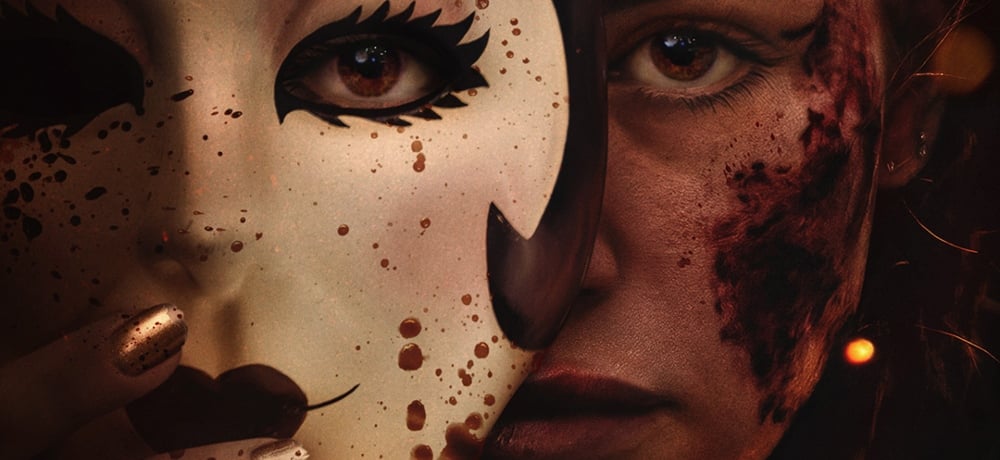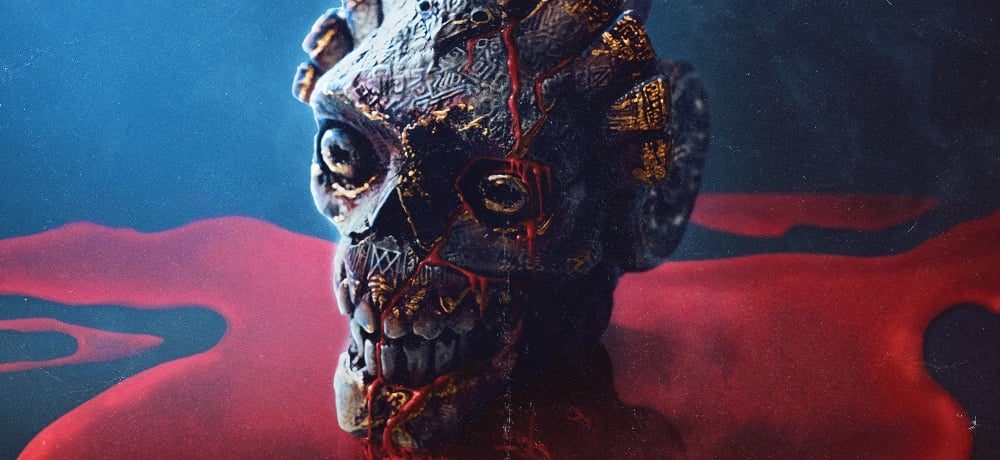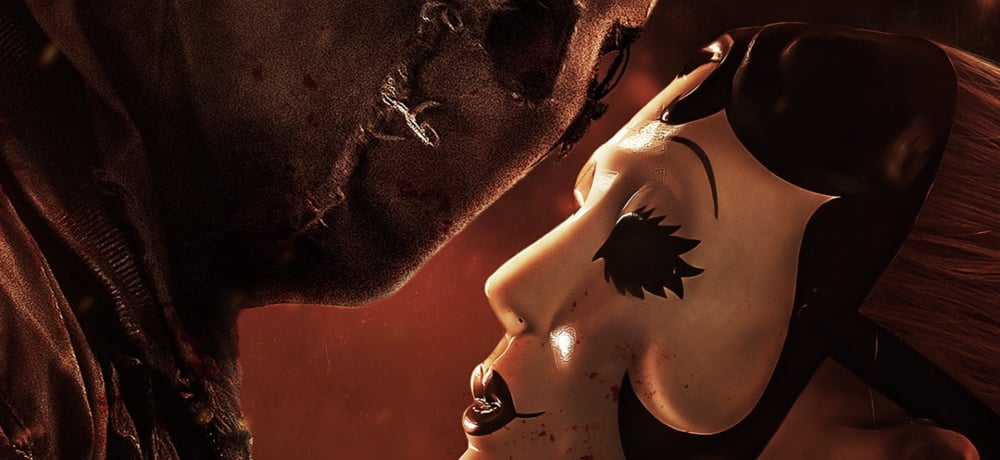





It’s been nearly seven years since Eric Stanze’s indie shocker Ratline was released, but his follow-up directorial effort, In Memory Of, recently made its debut on Blu-ray and is currently available for purchase HERE. Starring newcomer Jackie Kelly (who also helped co-write the script with Jason Christ), In Memory Of is a hallucinatory trip straight into Hell, when a young woman named Amber sets out to find the truth behind a horrific experiment that left her suffering and unable to remember anything from her childhood. Confused and in search of a mysterious stranger (played by Christ) who can answer all of her questions, Amber travels cross-country looking to put the pieces of her shattered life back together.
Daily Dead recently had the opportunity to check in with Stanze and talk about the release of his latest feature, and he discussed working on the script with both Christ and Kelly, putting his faith in Kelly for the film’s leading role, the cathartic process of making In Memory Of, and much more.
Let’s start off by talking about how this story came about. Was there something in particular about this journey Amber goes on in the film that felt right to take on for your follow-up to Ratline?
Eric Stanze: I'd been wanting to do a road trip film for about fifteen years. In that span of time, we developed and discarded multiple road trip projects. Nothing seemed to click. Then, Jason Christ brought me his idea of having a woman on the road, searching for happy childhood memories that had been erased due to a botched medical experiment. And finally, everything fell into place. It was the kind of movie I wanted to make next, something experimental, very fever dream—a horror movie, but not firmly planted in that genre. Finally, having a road trip film, albeit a very bizarre, twisted one, was very exciting to me, as I was more eager than ever to have the experiences I knew that kind of project would give me.
And it was intriguing to think about what the main character was enduring. Before we started writing, we discussed how memories form who we are as human beings. So, if memories are taken away from us, we would not still be the same person, right? Jason and I had both witnessed family members lose their memory in old age. In my case, it was my grandmother, who after suffering a series of strokes, lost all of her longterm memory. Even though she could not remember anything past five minutes ago, she still seemed like the same person—same personality, same wit, same tenacity. Her memory was completely erased—nothing from her entire lifetime was left—but somehow, she still seemed like the same person. How was this possible? We did not want to hit that philosophical note directly in our movie, but discussing it before we started writing definitely put us in the right mindset.
What was the writing process like with Jason? Because you guys have frequently collaborated with each other now for over a decade, I was wondering if there was something different about this process versus the projects you both have worked on together prior to In Memory Of?
Eric Stanze: In terms of the process, writing In Memory Of was basically the same as how Jason and I had written previous screenplays. What was different this time was how the writing felt to us. We noted that writing In Memory Of seemed more infused with creativity and imagination compared to past collaborations, and writing it was more fun.
It's always been a very positive experience writing with Jason, but this one was special, it seemed, and not just because we added Jackie Kelly to the writing team. Writing this film solidified why In Memory Of was the perfect film to make next. It was a project that gave us permission to go exploring creatively. Nothing was off limits. We felt no need to adhere to the typical and expected screenplay structure. We felt no obligation to follow any trend. If we came up with something that we assumed other writers and producers would deem too weird, too controversial, too risky, or too confrontational, we at least discussed including it in this script.
There was no studio, no outside producer providing the budget and then hovering over us to make sure we didn't take too many creative risks. There was nobody who could tell us "no," and we really embraced that. Can we make a film that fits within the parameters of a producer or a studio supplying a proper budget? Of course we can. But that was not a factor in this project, so we went way off the beaten path and turned In Memory Of into whatever we wanted. It was wonderful.
This is easily your most ambitious feature to date in a variety of ways. Can you talk about pushing yourself as a filmmaker on this project, and taking some big chances?
Eric Stanze: It honestly didn't feel like I was pushing myself. It felt like I was being turned loose. It was not easy to keep the train on the rails, for sure, but I found doing something so intimidating and ambitious exciting. I enjoyed putting together the puzzle of a complex shooting schedule, and then keeping all those plates spinning over the course of 46 shooting days. I was pushing myself, of course, but to me, it really just felt like I was in my element. And taking chances on a creative level? In Memory Of was custom-built for that in the first place, so it did not induce anxiety. It was thrilling.
Jackie Kelly, who plays Amber, is pretty much the heart and soul of this film. She’s in nearly every single scene. Can you discuss working with her and helping her tackle this character, whose fractured memories take her on this disturbing journey?
Eric Stanze: Jackie is indeed in every scene. Of our 46-day shooting schedule, she was required on set for 45 of those days. It was a massive weight for her to carry, and she really delivered. She did not buckle under the pressure, she did not wear out, she did not fray at the edges... not even near the end of the shoot. And she gave us a remarkable performance—extremely impressive considering it was her first feature film, and she had only acted in a few shorts before jumping into this. Also, while Jackie does have a degree in screenwriting, she has no formal training as an actor, so it was pretty amazing how capably she weathered the long haul of playing Amber.
Jackie had already been on the film as a producer and co-writer before we cast her in the lead. When the three of us started writing, we did not have anyone in mind to play Amber. We assumed we'd get the script shaped up, gain a firm understanding of what kind of actor we should seek out for the role of Amber, and then go on a search for that person. I knew Jackie had been acting, mostly in live theater, since she was 12. And I had seen her performance in a short film (which she also wrote and co-directed) so I knew she was a talented actor. At our very first story meeting, I had the initial spark in my brain. I thought maybe she would be right for the role of Amber, but it was too early to express this to anyone.
About a month into the writing process, I talked to Jason and Jeremy Wallace and told them I was thinking of Jackie for the lead role. Both Jason and Jeremy enthusiastically agreed she would be perfect for the part. Understanding the time commitment, and knowing how much pressure she would be under if she accepted the part, Jackie took a week or so to think it over. I am beyond thankful she came back and said "yes."
On set, Jackie and I had exactly the kind of actor/director relationship that should exist to produce the best results. She asked all the right questions and she took direction amazingly well. She was very prepared and focused, and she gave everything she had to deliver what I was seeking as a director. But our work together was unique in that she was also a producer on the film, and she had co-written the script with us. She was collaborating with me, not just as an actor, but as one of the architects of In Memory Of, pushing it forward and protecting it just as much as I was.
Can you talk about how your experiences on In Memory Of changed you as an artist?
Eric Stanze: Making In Memory Of reinforced me more than it changed me. It reinforced my attitudes about how I should be functioning as an artist. Between Ratline and In Memory Of, I spent a lot of time working on other people's movies, working on bigger-budgeted films. And I spent a considerable amount of time in development on bigger-budgeted projects that I would have produced or directed... projects that never came to be. I am grateful for those experiences and how they offered me different perspectives. It seems a lot of people would come out of those experiences thinking they need a lot more than they had on their past low-budget films to make a movie. But dropping down to a much lower budget to make In Memory Of did not bother me—in fact, it felt great.
Between Ratline and In Memory Of I gained more confidence that I can work well with a bigger budget, a bigger crew, and tighter parameters. But when tasked with making a film the way we had to make In Memory Of, there is still much to embrace and enjoy. I've always made what I wanted to make, and I've always been comfortable taking creative risks, but In Memory Of reinforced my already existing attitudes about working with limited resources. If told you cannot do something because you don't have enough money, figure it out, do it anyway, and feel free to break the rules to accomplish your goals. But more importantly, make your movie for yourself, first and foremost. Don't make it to get famous, or to get glowing reviews or praise, or to prove you can make a film that mimics something else that's hot right now. Satisfy yourself as an artist. Anything else comes after that.
Was it cathartic to explore this story as a filmmaker, since many times these things that we create can help us channel things inside of us that we may not realize initially? (I might be reading too much into everything, but this story feels very introspective.)
Eric Stanze: Exploring the story and themes of In Memory Of was absolutely cathartic. The process of making the movie did bring to the surface fears, frustrations, doubts, and confusion that were deep in the dark corners of my brain. And while the fears, frustrations, doubts, and confusion were heavily filtered, broken up, and reassembled through the creative process, the catharsis was there. Despite how grueling the making of the film was, and despite how dark and aggressively strange the movie is, I emerged on the other side in a much better state of mind. Interesting how creating and submerging yourself in a nightmare can bring you so much calm and clarity, like the beautiful weather that follows a violent and destructive storm.
---------
In case you missed it, check here to read Heather's Q&A with In Memory Of co-writer/co-star Jason Christ.